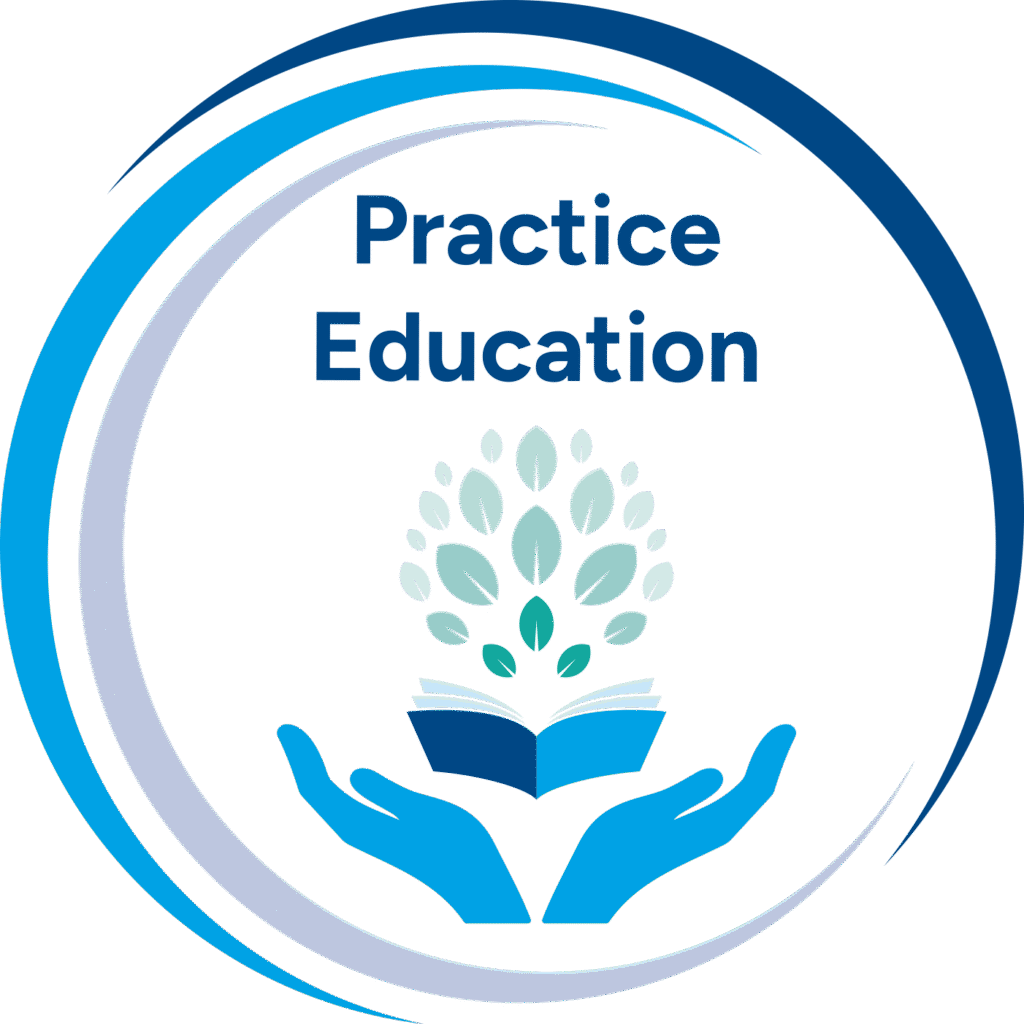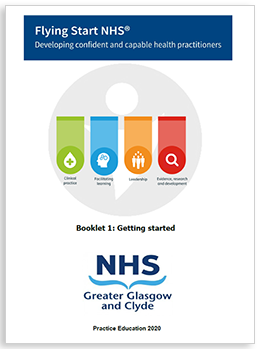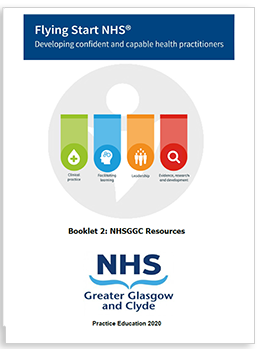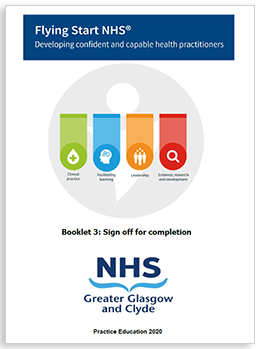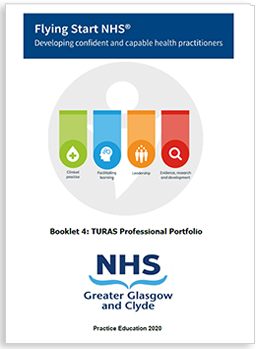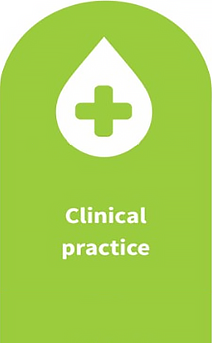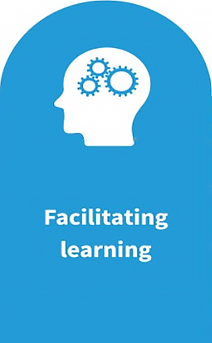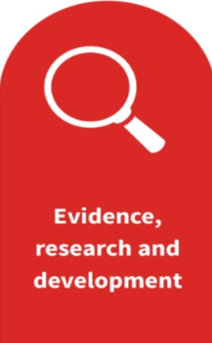This section provides practice supervision / assessment related documents and resources for all those involved in the supervision and assessment of student nurses and midwives within NHSGGC. If you can’t find what you are looking for here, our FAQs might help.
Audio Podcast
Enjoy our audio podcasts at a time that suits you. We offer a series of 5 podcasts giving information on the new NMC standards and a variety of topics to support your CPD in the practice supervisor or practice assessor role.
Blood Glucose Monitoring for Student Nurses and Midwives
NHSGGC Pre-Reg Student Nurse and Midwife Blood Glucose Monitoring Process outlines the process to allow student nurses (all fields) and midwives to obtain their own unique barcode to operate the Abbot FreeStyle Precision Pro System, blood glucose monitor.
Blood transfusion
Please refer to page 9 of the GGC Clinical Transfusion Policy for information on the involvement of students in the transfusion process.
Communication and relationship management skills – Examples from practice
This resource has been developed to assist you in your role as practice supervisors and practice assessors to support students to achieve Annexe A: Communication and relationship management skills.
FAQs
Can’t find an answer to your question. Our FAQs might be able to help.
Roles in student assessment
Does a student need both PS/PA?
Yes, The roles of mentor, sign-off mentor, practice teacher and teacher have been withdrawn, and three new roles introduced to undertake the supervision and assessment of students; the practice supervisor, practice assessor and academic assessor.
Can I be a PS and/or PA to two students at once?
You cannot be the PS and PA for the same student – each student must have two different people assigned – one as PS and another as PA – this cannot be the same person. However, you may carry out both roles at the same time for different students, for example, you may be the PS for one student whilst also being the PA for another student. You may also be the PS or PA for two different students at the same time.
Can I be both roles for the same student?
No, you cannot be both PS and PA for the same student. However, you can be PS for two different students, PA for two different students or PS for one and PA for another as guidance contained in A National Framework for Practice Supervisors, Practice Assessors and Academic Assessors in Scotland
How much time do I need to spend with my student before signing them off?
There is no set time a student needs to spend with their PS/PA. However, we would recommend that students work alongside their assigned PS/PA as much as possible for continuity.
The Practice Supervisor and Practice Assessor are responsible for gathering feedback from other staff in their area that have worked alongside their assigned student to deliver a fair and objective assessment.
How do I access student feedback?
Student feedback for Practice Learning Environments is submitted via “QMPLE”. Each area has an assigned member of staff (e.g. charge nurse, SCN or Educator) who will have access to view feedback submitted by students. All feedback via QMPLE is anonymous and is released after review from both Practice Education Facilitator and the link lecturer for the area. Practice Education would encourage PS/PAs to obtain individual feedback in their role from students (if they are willing to do so) which can then be used for their revalidation and to help improve upon their practice.
Student documentation and assessment
This is a placeholder tab content. It is important to have the necessary information in the block, but at this stage, it is just a placeholder to help you visualise how the content is displayed. Feel free to edit this with your actual content.
What does a student Practice Assessment Document (PAD) look like?
Examples of PADs from different universities.
Also, this interactive PAD resource will provide you with information and guidance on how to complete the different sections of the Practice Assessment Document. From recommended timelines for each stage of the student journey, who completes the different sections, to clear and simple examples of evidence needed for each platform.
Who can sign what in the PAD?
- Orientation and intial meeting – PA or PS (to be completed within first 48 hours)
- Learning Development Plan – PA or PA
- Record of signatories – PA and PS (individual records for each role)
- Interim review – PA or PS
- Service user/carer feedback – PA or PS (one required per PART)
- Proficiencies – PA or PS
- Skills and procedures – PA or PS
- Final assessment – PA only
- Attendance record – PA or PS (complete after each week)
- End of part confirmation – PA only (discussion between PA and AA to agree on student progression)
How do I complete an interim assessment?
The interim assessment is usually completed mid-way through the placement. It is recommended that a date is set for the interim assessment during the first 48 hours of placement.
The interim assessment can be completed by either the Practice Supervisor (PS) or Practice Assessor (PA). It may be that the PS completes the interim assessment to allow the PA to complete an objective final assessment at the end of the placement, but this is not essential.
If there are concerns surrounding a student’s performance the interim assessment can be completed early or alternatively, you may wish to complete several interim assessments throughout the placement to reflect and document the student’s progress.
The NMC agreed the new standards for student supervision and assessment in 2018. They have structured the standards into 7 platforms – the interim and final assessments are structured around these 7 platforms and, additionally, any progress made within Annexes A and B. Further information on the standards can be found here: NMC Standards for Supervision and Assessment
It can be helpful to look at the language used within the proficiencies (blue pages of the PAD) relating to each platform as an aid to structure your feedback.
The interim assessment is also a good opportunity to ask the student if they have any feedback that they would like to provide regarding their placement.
If any issues are raised during the interim assessment (or at any point throughout the placement) please contact your PEF/CHEF. You can find their details here: Who is my PEF/CHEF?
How do I grade my student?
Glasgow Caledonian University (GCU), University of Glasgow (UoG), Open University (OU), and University of West of Scotland (UWS) all utilise different grading for their students.
UWS: Pass or Fail
OU: Pass or Fail
UoG: Graded A-H using a specific grading rubric per PART
GCU: Graded A-F using a specific grading rubric per PART. Each platform is graded individually and then an overall grade is calculated using a percentage,
Please see example using link:
My Colleague and I disagree on a student’s performance, what should we do?
If there is a disagreement between a Practice Supervisor and Practice Assessor, Practice Education would advise having a discussion around the differences between each other’s observations. It would also be useful to look back at previous assessments (if appropriate) to look for common themes.
We would also advise reviewing the grading rubric for the specific learning stage of the student using the participation in care framework.
Another tip would be to ask other staff who have worked alongside the student. What are their observations? Are there any differences? For further information or advice, reach out to the PEF/CHEF for your area. Who is my PEF/CHEF?
Our Student’s PA is on annual leave for the student’s last week, who signs them off?
The student should be assigned another Practice Assessor as soon as possible.
The new Practice Assessor should gather feedback from the original Practice Assessor if appropriate and from Practice Supervisors/ other staff in the area in order to complete a fair and objective assessment.
My student has forgotten their PAD on multiple occasions, what can I do?
Students are expected to bring their PAD with them on their first day of placement
and if they do not bring it on the first day then must bring it on their second day. If they then do not bring it you can send them home to retrieve it as it is there responsibility to make it available to their PS/PA throughout the placement.
The student should bring the full document with no pages/sections missing. If the student is continually forgetting to bring their PAD despite being prompted to do so then contact your PEF/CHEF for further advice and support.
I have some concerns regarding my student’s performance, what should I do?
Both the student and Practice Supervisor/ Assessor have access to a Practice Learning Support Protocol which details the steps to follow should there be any concerns. It is important to highlight these concerns as soon as possible. A copy of this can also be found in the student PAD.
How do I complete a Learning Development Support Plan?
You may have a student who requires some additional support to achieve a specific learning outcome/proficiency for example, time keeping, assessment skills, improving communication. In this situation it may be helpful to create a Learning Development Support Plan (LDSP) to support and guide the student to meet the outcomes required.
These sample Learning Development Support Plans will to help you to write an effective plan to support students to progress in their practice learning environment. There is also an example LDSP within the PAD.
You will also find an example Learning Development Support Plan within the PAD and further examples are available through this link:
If you are implementing a LDSP you may wish to contact your PEF/CHEF for support and guidance.
Attendance and Rostering
My student has said they have a part-time job and cannot work certain shifts, how should this be approached?
All students are made aware of the Working Time Directive prior to undertaking their placement. By law, the Maximum weekly working hours state they can only work a maximum of 48 hours per week (on average) which includes placement hours.
How many hours does a student get credited with per shift? Are breaks included?
Students should be credited with full shift hours, including breaks. For example, 7am-7.30pm shifts would be credited as 12.5 hours.
9am-5pm shifts would be credited as 8 hours.
**Reduced working week does not apply to student nurses
My student is requesting specific/ adjusted hours. How can we accommodate this?
Students are made aware that they have a requirement to be flexible to accommodate their placement hours. However, this is not always possible.
Practice Education would advise that any adjustments (within reason) are made at the area’s discretion. Students should NOT be credited with any hours they have not worked.
My student has an organised study day at university, are they credited hours for this?
Credited study days are usually highlighted within the original placement allocation email which is sent out to the student link for your area. This may be your SCN/ CN or Educator. However, sometimes study days can be arranged following these emails and the university may advise students to make their placement aware. Some of these are credited and some are not. If you are unsure, reach out to your local PEF/CHEF who will be able to find out for you.
My student has an appointment during shift time, what is the policy for this?
There is not a specific policy in relation to allowing time for appointments. However, it is encouraged by both Practice Education and Educational Institutions that students inform their PLE manager of any scheduled appointments at their earliest convenience so accommodations such as shift changes can be made.
My student hasn’t turned up for their shift or called in sick, what do I do?
All students must adhere to the NHS GGC/ local absence reporting policy. This is explained to them prior to placement and detailed within their student documentation. They also have a duty to report any absences to the university. The way of doing this differs between universities but this information is readily available within the guidance pages of the students Practice Assessment Document.
The PEF/ CHEF for your area will be able to contact the student’s PT if there are any concerns regarding absence.
Reasonable Adjustments
My student has disclosed a disability/learning need, how do I approach this?
Firstly, it is at the student’s discretion whether they disclose any additional learning needs or disabilities. This can sometimes make our roles as Practice Supervisors and Assessors a bit more challenging but there are resources available to support you. Students can often have a Reasonable Adjustment Plan or a “RAP” in place from the university. Should the student wish to share this with their PS/PA it should remain confidential and should be accommodated where possible.
Your local PEF/ CHEF will be on hand to support you with this.
Additional information and support can be accessed via our Practice Supervisor/Practice Assessor Portal
Practical Skills
Can my student take part in venepuncture and cannulation/ IV medication?
Yes, they can, however, this depends on the stage of training the student is at and whether they have had the relevant theory within University. It is important to note that when this theory is delivery may differ between different fields of nursing which is detailed in the skills statement linked below. When undertaking these skills student nurses and midwives must do so under the direct supervision of a registered healthcare professional who is competent in the skill.
Please see the staff guide for new NMC Skills and Procedures for student nurses.
Can students countersign and administer controlled medication?
Yes, Students can be involved in controlled medication administration as per NHSGGC Administration of intravenous (IV medicines and flush policy.
Responsibility ultimately lies with the administrator of the drug unless a student nurse is involved. Therefore, it is the responsibility of the registered practitioner.
Other common questions
How does my student get an ID badge?
All students should have photographic ID in the form of their student card from their university.
Swipe cards for student nurses are only available for students on placement at QEUH/ RHC at this time. This does not apply to other sites within NHSGGC.
Students about to commence their first placement within QEUH/ RHC will receive an email from university advising how to obtain a swipe card. However, they can also contact their PLE’s local PEF who can pass on a form to obtain a swipe card. They need to complete and print this form and take it to the sites facilities open sessions which are held between 9am-10am
Learning Development Support Planning
Learning Development Support Plans are used to support students to meet specific objectives, particularly if they face challenges in achieving the level of knowledge and/or skills required by their educational programme or if there are concerns regarding their professional practice. These sample plans can be used to help you to write an effective Learning Development Support Plan to support students to progress in their practice learning environment.
- Communication
- Contributing to the team
- Documentation and record keeping
- Medicines Management
- Mental Health Assessment
- Professionalism – Limitations of Practice
- Specimen Collection
- Professionalism – Timekeeping and Absence Reporting
**Coming Soon** Learning and Development Support planning resource and Assessment and Grading Terminology document.
NES Pharmacology Learning Resources Toolkit
This resource will supplement practice supervision / assessment in the workplace for student nurses and midwives. Additionally, it is practice supervisor and practice assessor facing and provides information and guidance on Pharmacology.
New skills and procedures for student nurses
Practice Assessment Documents
(NHS Scotland sign in may be required)
- University of Glasgow
- GCU – Adult
- GCU – Mental Health
- GCU – Learning Disability
- GCU – Child Nursing
- UWS – Mental Health
- UWS – Midwifery
- Open University
If additional PAD pages are required, please refer to the relevant PAD and print the individual page(s).
PAD Terminology for Practice Supervisors and Assessors
If you’re unsure about the terms used in the PAD when it comes to student assessment, we’ve created a helpful guide just for you. the PAD Terminology for Practice Supervisors and Practice Assessors explains key terms (called level outcomes) and gives examples to help you understand what’s expected of your student by the end of their placement.
Practice Learning Support Protocol
These flowcharts illustrate guidance for student nurses and midwives, as well as PS / PAs, on dealing with concerns, although not care concerns, we come across in Practice Learning Environments.
Practice Supervisor Practice Assessor Checklist
Use our Practice Supervisor Practice Assessor Checklist to identify key areas will ensure your student has a smooth journey throughout their practice learning experience.
Raising concerns in practice
Raising concerns in practice – a national approach for nursing and midwifery students, non-NHS practice learning experience providers and higher education institutions in Scotland.
‘Speaking up’ – National Whistleblowing Guidance for Nursing and Midwifery Students in Scotland
This guidance details the process for raising a concern and intends for nursing and midwifery students in Scotland to use it while undertaking PLEs during their pre-registration nursing and midwifery programmes.
Strengthening Student Nurse and Midwife Practice
This 10 minute narrated presentation on Strengthening Student Nurse and Midwife Practice will help practice supervisors and practice assessors to develop increased insight and awareness around supporting student nurses and midwives with additional competency requirements (NHS Scotland log in required).
eHealth and Student IT Information
Student Access to NHSGGC eHealth Systems
Students on placement are issued NHSGGC eHealth accounts to enable access to essential digital systems.
First-Time Login
Guidance for logging in for the first time is available from NHSGGC Student IT Access
Reporting IT Issues and Accessing Learning Resources
Students must register for the West of Scotland eHealth portal to:
- Raise IT support tickets
- Access additional eHealth learning materials
Important:
Students do not have access to staff eHelp services and must not contact the IT Service Desk directly.
- a step-by-step guide to registering and using the student eHealth portal is available from NHSGGC Student eHealth Portal
- The portal is accessible from any web browser and does not require access to an NHSGGC computer.
Quick Overview
A downloadable poster summarising the student access process is available from NHSGGC Student eHealth Awareness Poster.
Newly Qualified Nurses and Midwives (NQN/Ms)
A step-by-step flowchart outlining the NHSGGC process for requesting eHealth accounts for band 4 NQN/Ms is available to support NQN/Ms and their line managers in updating or requesting eHealth account access and creating an NHSGGC email address.
Need eHealth help?
If you’re unsure where to start or need further support, please contact your Practice Education Facilitator or refer to the guides above.
Supplementary factsheets about specific eHealth programmes
Hospital Electronic Prescribing and Medicine Administration (HEPMA)
Student nurse Digital Clinical Notes module on TURAS Learn
University Programme Information
- University of Glasgow
- Glasgow Caledonian University
- University of the West of Scotland
Return to our Practice Supervisor / Practice Assessor Portal
